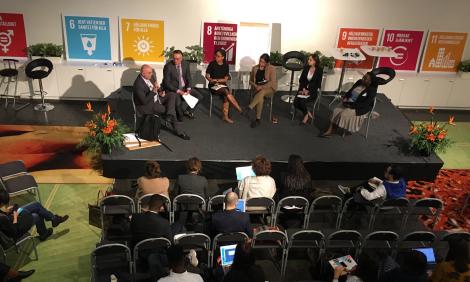
Feminist talk
Making our presence felt: women's involvement in online content creation in Ghana
In this exploration of the questions of access and economy for women in Ghana, the author takes a closer look at the digital gender-gap. When women don't have equal access to the internet then what are the economic implications?

Feminist talk
Framing access and power at Stockholm Internet Forum 2017
The Stockholm Internet Forum 2017 focused their discussions on the links between access and power. In this article Shaikh Rafia Sarwar examines how access is linked to women's empowerment and particularly their economic empowerment. And whether the debate around access should focus on economic, cultural and social empowerment of women through and outside technology, rather than ensuring access to…
Publication
The 2015-16 Affordability Report
The 2015-16 Affordability Report looks at the affordability environment across 51 countries, considers the effects of poverty and income inequality and takes a close look at gender inequality in access to the internet. A4AI considers that the connectivity lag will undermine global development across the board, contributing to lost opportunities for economic growth and denying hundreds of millions…
Publication
"What went wrong?" Anita Gurumurthy's statement at the closing ceremony of WSIS plus 10 review
The statement by Anita Gurumurthy, Executive Director, IT for Change, at the closing ceremony of WSIS plus 10 review held by UNESCO from 25th to 27th February, 2013, starts questioning _"what went wrong?"_ in the last decade since the internet should have been been equalising social and economic opportunity. Why did the internet, and the information society phenomenon not do what it was supposed…
Publication
Social Outsourcing as a Development Tool
This paper assesses the impact of a social outsourcing initiative operated by the government of Kerala State, India. Part of this outsources information technology (IT) services to dozens of cooperatives of women from below-poverty-line families in order to improve their socio-economic status. While raising questions about sustainability of the initiative, the research finds that social…
In depth
Financing for ICT for Development in India
Information and communication technologies (ICT) is increasingly recognised by governments, the private sector and civil society alike in its potential to address existing obstacles to social and economic development of disadvantaged groups, as well as to transform the very systems that create inequalities in the first place. To this end, the work of ICT for Development (ICTD) is critical.…
In depth
Where is the Money for Women's Rights Work on ICT? A brief look at the funding landscape for women’s organisations working on information and communication technologies
 In collaboration with the Association for Women's Rights in Development (AWID), Lucía Carrasco, Fernanda Hopenhaym and Cindy Clark focuses the findings from "Where is the money for women's right? Strategic…
In collaboration with the Association for Women's Rights in Development (AWID), Lucía Carrasco, Fernanda Hopenhaym and Cindy Clark focuses the findings from "Where is the money for women's right? Strategic… In depth
Do women’s access to ICTs lead to empowerment? Looking at the CEEWA ICT project in rural Uganda
Is there a direct connection between empowerment and access to information and communication technologies? Patricia Litho interrogates this question through the CEEWA ICT project case study in rural Uganda. She examines the conceptualisation of empowerment, and its relationship with infrastructure, skills, connectivity, access and participation.
In depth
Women’s networks for effective communication
Dafne Sabanes Plou is the regional coordinator for Latin America for the APC Women’s Networking Support Programme (WNSP). In mid-March she coordinated the “Building inclusive community networks” workshop in Comodoro Rivadavia, Chubut Province, Argentina, in which women interested in learning about strategic uses of information and communication technologies took part. This is an account of the…
In depth
Gender, Trade and the role of ICTs in economic growth
While trade offers opportunities for women's socio-economic empowerment and growth in Africa, it can perpetuate women's marginalisation and gender inequalities, which in turn hamper growth and development, the ultimate goal of trade.




